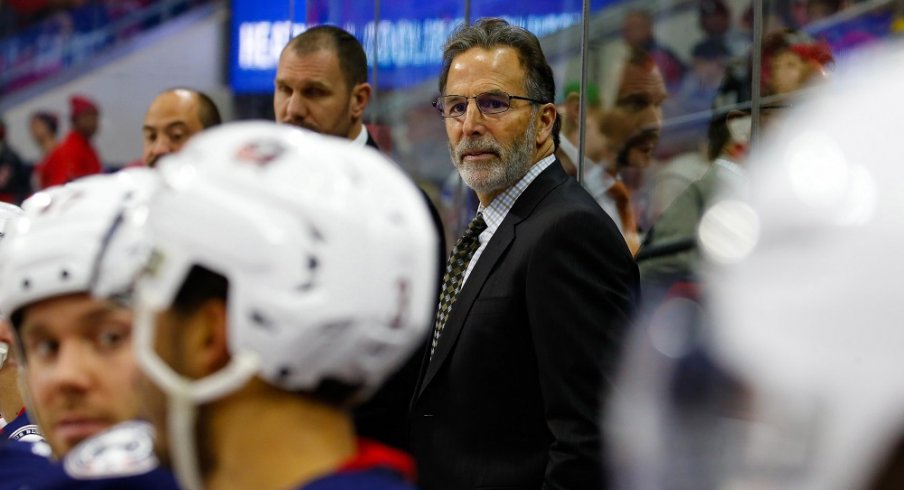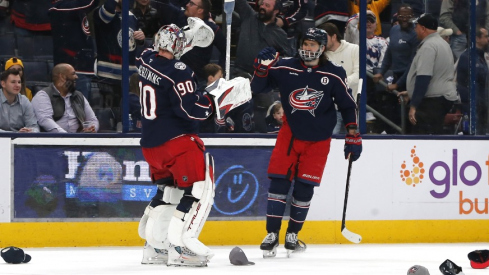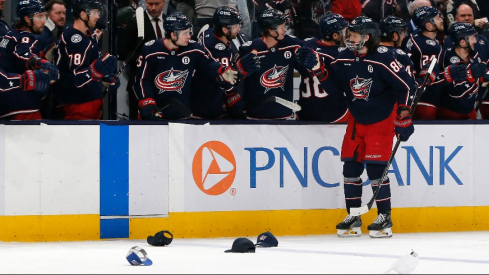When I think about the hire of John Tortorella, I think of two distinctly different reactions.
First, the Columbus Blue Jackets fan base felt conflicted but hopeful. Tortorella’s reputation as volatile and hard-edged had preceded him, but he’d also had success in the NHL. Anyone who could help turn around what very much felt like a sinking ship in October 2015 would be appreciated by fans in the capital city
Then there was the reaction by many around the league. It feels to me like it bordered on the following at the time – what were the Blue Jackets thinking?
And now there’s some egg on the face of those who doubted Columbus after Tortorella won the Jack Adams Award last night as the NHL’s best coach. But even if he hadn’t earned his second such honor, for this current iteration of the Blue Jackets, he’s clearly the right man in charge.
The facts are obvious, but we’ll go through them again. Last year, Columbus won 50 games and reached 108 points, good for fourth in the league and both of which raced past franchise records. The Blue Jackets had the unfortunate draw of taking on the defending and soon-to-be champs in Pittsburgh in round one of the Stanley Cup Playoffs, but their success was celebrated this week with captain Nick Foligno winning multiple leadership awards, Sergei Bobrovsky taking home the Vezina and Zach Werenski being nominated for the Calder.
Would any of this have happened without Tortorella? Perhaps. Bobrovsky was surely motivated by a disappointing 2015-16 season, Werenski would have been impressive with me as the coach, and the team could have been a playoff squad even with just those things happening.
But let’s look at Foligno. He certainly deserved the captaincy nod when it was handed to him after the 2014-15 season, but it’s also fair to say the next campaign – one that started 0-8 and with the replacement of coach Todd Richards with Tortorella – was a disaster for the team’s new leader. After the campaign, Tortorella challenged Foligno and made it clear he could be replaced.
That challenge clearly hit the mark, as Foligno’s personal production returned to form and his leadership skills also now are being celebrated. While the particulars of the relationship are likely to remain between coach and player, there is a broader lesson here – challenges are to be met head on and deficiencies to be improved.
The phrase “country club atmosphere” has been used enough to describe the Blue Jackets locker room in the franchise’s history that it has almost become cliché, but it also seems clear the standard has certainly been raised inside the organization since Tortorella became the coach.
Can he be prickly? Yes, at times. Woe to the media member or player who loses the head coach’s respect. But it also seems clear that those who cast Torts as a cartoon character, a madman who growls for the sake of growling, clearly have missed the boat.
It’s easy to typecast a man who once tried to storm an opposing locker room and whose press conferences have been testy at times, and when that’s all the highlight shows put on the air, opinions get forged and forged quickly.
But the Tortorella I’ve seen since his hiring by Columbus has been a much more three-dimensional character than that. Listening to a Tortorella press conference is fascinating; his thought processes and explanations for everything from strategic moves to organizational strategies are always enlightening. Every time he talks, anyone who is listening can learn something about the sport or the dynamics of leadership and coaching.
On the ice, he’s proved to not be the stereotype many expected as the grit-over-flash, block-shots-or-else taskmaster. Recognizing he had a young roster with a lot of speed and some flair to it as well, he instituted a mantra that declared “Safe is death,” encouraging the team’s battalion of youngsters to play to their talents rather than worry about making mistakes.
Yet somehow, this has come as a surprise to certain parts of the hockey community. Tortorella was famously installed as betting favorite to be the first coach fired last season, and many laughed when it was suggested he was the right coach for the young Blue Jackets. By many, I mostly mean Dave Lozo, but it is also fair to say there was plenty of skepticism about Tortorella after he flamed out in Vancouver and led the U.S. World Cup team to an ignominious end.
Using just the most recent examples of Tortorella’s leadership, though, ignores a long and impressive history as a coach. He led Tampa Bay to the Stanley Cup in 2003-04, winning his first Jack Adams along the way, and coached the Rangers to another Cup final. He’s the winningest American coach of all time and has generally succeeded wherever he has gone.
Now, that success is coming to a head in Columbus, and Tortorella wants more.
“It’s showing the league we’re coming,” he said ahead of the NHL Awards show when asked about the large CBJ contingent in Vegas. “We still have a ways to go, but I think we’ve put ourselves on the map here. Now the hard part starts – it’s doing it again and also improving.”
He’s right – the Columbus Blue Jackets are now on the map. And there’s little doubt John Tortorella is the right man to be charting their course.


